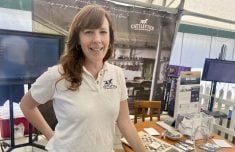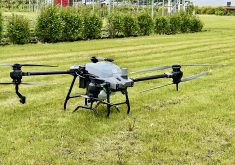Lori Stahlbrand is pumped. She’s just back from an event that she bills as “speed dating for farmers,” a get-together that she helped organize where farmers bring their products and meet with restaurateurs, distributors and retailers.
It’s an event that makes today just like every other day for Stahlbrand. There’s been lots of talk, followed by even more talk, but at the end of it all, something has also happened. More farmers are shipping more food to consumers, almost always at a premium price.
Read Also

Producers aren’t panicking over tariffs and trade threats
The Manitoba Canola Growers Association (MCGA) surveyed its members this spring to get a sense of how trade uncertainty was…
Stahlbrand, after all, is the founder and president of Toronto-based Local Food Plus LFP), and she’s the local-food legend who gets the lion’s share of the credit for convincing the University of Toronto to switch its cafeterias to local food.
She’s famed for making change, not just for talking about it. And for the past decade, her energy has been devoted to one goal, getting Canadians to change how they buy food.
When we meet for a coffee in Toronto’s trendy Beaches neighbourhood, Stahlbrand is frank about the limitations of local food. It’s a confession maybe brought on because I’m bound to ask the obvious. “Was this coffee grown within 100 miles?”
I never get a chance. “We’re always going to bring in coffee, spices or tea,” Stahlbrand says. “We’re not promoting that we should never eat another banana.”
That said, Stahlbrand believes that Canada does import, and export, too much food. That’s because she believes our export-based food system is bad for farmers and bad for consumers too and that at some point it will become unsustainable, environmentally and economically.
Stahlbrand hopes LFP, a non-profit organization, can stimulate changes in the food system that will give farmers profitable and stable local sales channels alongside existing export markets. It means creating structured demand for local food, along with infrastructure for its delivery.
Stahlbrand is so passionate about sustainable food systems that she started a PhD on the subject. Theory wasn’t enough, though, so she formed LFP. “I decided I didn’t want to write a thesis,” Stahlbrand says. “I decided I wanted to get out and do it.”
A familiar voice
You would likely recognize Stahlbrand’s flowing voice. A former journalist and broadcaster with CBC, she has worked across the country on radio shows including World at Six, Ten O’Clock News, and The CBC Hourly News.
Her broadcast experience shines through. Articulate and composed, her hands are still as she speaks. But Stahlbrand is also very down to earth, with ample laughter, smiles and nods.
After settling in Toronto, she left the CBC to co-author a book about food systems, Real Food For a Change. She’s no slouch on the subject. Along with a master’s degree in environmental studies, she has taught a food security course at the University of Toronto.
While describing her upbringing as “totally urban,” Stahlbrand isn’t afraid to immerse herself in farming issues. She spends her vacation working on farms. Describing the farm where she and her family worked this past summer, she notes, “They work so incredibly hard.”
Nor do her urban roots make her hesitant to advocate change. “We all eat and we all deserve to be treated with respect and we all have a vested interest in quality food.
“I feel that I have something to say and I have a place in the food system that is important














